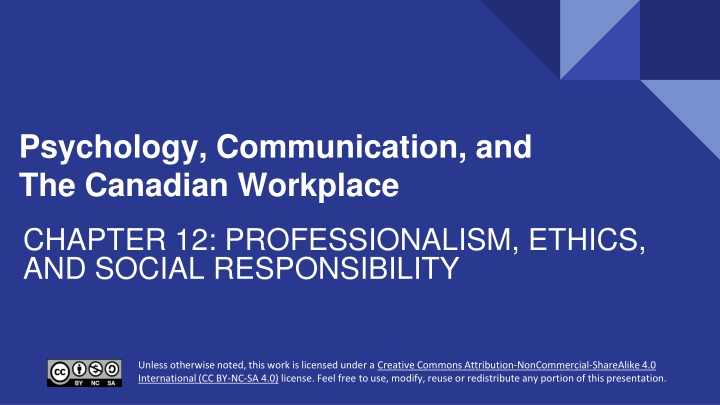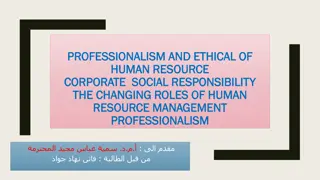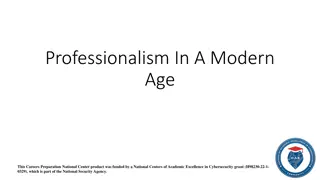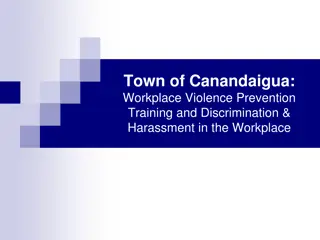Professionalism, Ethics, and Social Responsibility in the Canadian Workplace
This chapter delves into the concepts of professionalism, ethics, and social responsibility within the Canadian workplace. It covers the definitions of profession and professionalism, importance of respecting coworkers, personal responsibility, ethics, levels of ethics in organizations, sources of individual and organizational ethics, methods of ethical decision-making, as well as levels of social responsibility for organizations and individuals.
Download Presentation

Please find below an Image/Link to download the presentation.
The content on the website is provided AS IS for your information and personal use only. It may not be sold, licensed, or shared on other websites without obtaining consent from the author.If you encounter any issues during the download, it is possible that the publisher has removed the file from their server.
You are allowed to download the files provided on this website for personal or commercial use, subject to the condition that they are used lawfully. All files are the property of their respective owners.
The content on the website is provided AS IS for your information and personal use only. It may not be sold, licensed, or shared on other websites without obtaining consent from the author.
E N D
Presentation Transcript
Psychology, Communication, and The Canadian Workplace CHAPTER 12: PROFESSIONALISM, ETHICS, AND SOCIAL RESPONSIBILITY Creative Commons Attribution-NonCommercial-ShareAlike 4.0 International (CC BY-NC-SA 4.0) Creative Commons Attribution-NonCommercial-ShareAlike 4.0 International (CC BY-NC-SA 4.0) Unless otherwise noted, this work is licensed under a Creative Commons Attribution-NonCommercial-ShareAlike 4.0 International (CC BY-NC-SA 4.0) license. Feel free to use, modify, reuse or redistribute any portion of this presentation.
Learning Outcomes Upon successful completion of this chapter, you should be able to: Define the terms profession and professionalism. Understand the importance of respecting one s coworkers. Explain the concept of personal responsibility in the workplace. Define the term ethics . Identify levels of ethics within organizations. Understand sources of individual and organizational ethics. Describe different methods of ethical decision-making. Explain and give examples of the levels of social responsibility for organizations and individuals.
12.1 Professionalism I What is a Profession? A profession is an occupation that involves mastery of complex knowledge and skills through prolonged training, education, or practical experience. Photo by Usman Yousaf on Unsplash
12.1 Professionalism II What is professionalism? Professionalism isn t one thing; it s a combination of qualities. Photo by Christina @ wocintechchat.com on Unsplash
12.1 Professionalism III The Requirements of Professionalism Respect for Others Personal Responsibility Online Identity Management
12.2 Ethics I The word ethics actually is derived from the Greek word ethos, which means the nature or disposition of a culture (OED, 1963). Ethics is the judgmental attachment to whether something is good, right, or just. Picture Source- Pixabay
12.2 Ethics II Four Levels of Ethics in Organizations
12.2 Ethics III Sources of Personal Ethics Religion Culture Media Models Attitudes. Experiences.
12.2 Ethics IV Sources of Company Ethics Sexual harassment policy Workplace violence Employee privacy Misconduct off the job Conflicts of interest Insider trading Use of company equipment Company information nondisclosures Expectations for customer relationships and suppliers Policy on accepting or giving gifts to customers or clients Bribes Relationships with competition
12.2 Ethics V Ethical Decision-making Philosopher s Approach The Twelve Questions Model Picture Source- Pixabay
12.3 Social Responsibility The Four Areas of Social Responsibility
12.3 Social Responsibility II Individual Social Responsibility
12.4 Key Takeaways A profession is an occupation that involves mastery of complex knowledge and skills through prolonged training, education, or practical experience. Professionalism, on the other hand, involves the aims and behaviors that demonstrate an individual s level of competence expected by a professional within a given profession. Respecting our coworkers is one of the most essential keys to developing a positive organizational experience. There are many simple things we can do to show our respect, but one crucial feature is thinking about the types of langue we use. Personal responsibility refers to an individual s willingness to be accountable for what they feel, think, and behave. Part of being a successful co-worker is taking responsibility for your behaviors, communication, and task achievement in the workplace. Ethics is defined as a set of values that define right and wrong. There are four levels of ethical issues. There are four levels of social responsibility























